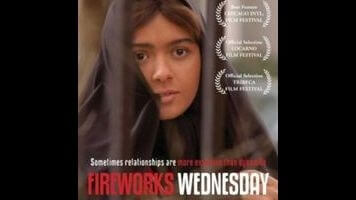Set over a single day in Tehran, largely in and around a single apartment complex, Fireworks Wednesday is about a marriage on the verge of combustion. But it’s also about someone on the verge of marriage—a young woman thrown into the middle of a domestic dispute, right as she is about to make that scary headlong plunge into matrimony. This is how it goes in the work of Asghar Farhadi: The award-winning Iranian filmmaker sees multiple sides to every story, frequently pitting them against each other. Fireworks Wednesday, arriving now in U.S. theaters a decade after its release in Iran, isn’t as multifaceted, as dramatically and motivationally complex, as Farhadi’s international breakthrough, A Separation. Then again, few films are.
The young woman is Rouhi (Taraneh Alidousti), beaming bride-to-be. A week out from her wedding, on the eve of the Persian New Year, Rouhi goes to work as a housekeeper for a wealthy family of three. How can she know she’s walking into an emotional minefield? Mojdeh (Hedieh Tehrani) harbors suspicions that her husband, Morteza (Hamid Farokh-Nejad), may be having an affair. She thinks the other woman could be her neighbor, Simin (Pantea Bahram), a recently divorced beautician who runs a salon out of her home, one floor down from them. Recruited, quickly and without much protest, to gather intel for her new employer, Rouhi becomes both observer and participant, getting involved in a conflict that—worst-case scenario—could be a vision of her own future. Is Morteza cheating on Mojdeh? Or is it all in the latter’s head, a paranoid delusion born from the couple’s general relationship woes?
Fireworks Wednesday carefully, organically introduces its characters, then lets the audience try to discern what they’re withholding. That’s the basic strategy of Farhadi’s movies, now opening Stateside in reverse chronological order, each “new” release a backwards step through his filmography: This one was made before About Elly, the terrific 2009 seaside drama that finally made its way to American theaters last year. It’s hard not to compare all of his films to A Separation, a tough act to follow either sequentially—in the case of its actual encore, The Past—or retrospectively. (It ranked No. 2 on our recent list of the best films of the decade so far, which this critic thinks is about one slot too low.) Farhadi, like most major auteurs, has a collection of pet obsessions: failing marriages; familial roles in middle-class Iran; and especially deception, the engine that powers each of his urgent dramas. Fireworks Wednesday checks all of those boxes, just with less sophistication than the masterpiece that came later; it builds to a single big reveal, instead of constantly, radically re-contextualizing its scenario with a whole string of them.
Still, this is no dry run. Judged inside or outside of its creator’s ongoing career—as early proof of his gifts or just a stand-alone domestic drama with the extra kick of mystery the filmmaker always applies—Fireworks Wednesday fascinates. Farhadi expertly orchestrates the chaotic intrusion, with characters constantly fluttering in and out of the apartment building (a faulty buzzer system creates extra collisions), while the family’s duress is complicated by everything from the disarray of their recently painted unit to an impending vacation to the noisy gridlock created by the holiday. (Apropos the title, the offscreen crackle of over-the-counter explosives adds an additional, sonic layer of agitation.) And as usual, Farhadi tackles his talky material with brio: Besides the usual finesse in which he navigates cramped interior spaces—this one more cramped than usual, thanks to the piles of plastic-wrapped belongings—Fireworks Wednesday offers several standout stagings, like a public confrontation between husband and wife that unfolds in one elaborate take, starting in a descending elevator and stopping at a safe distance from the altercation.
There’s something almost voyeuristic about that scene. It’s crucial to the film on the whole. As played by Alidousti, who would go on to bring a more crippling bashfulness to the title role of About Elly, Rouhi sometimes comes across as an audience surrogate, her eyes the window through which we view this faltering relationship. But that’s partially because Farhadi is interested in how said relationship looks from inside and out; a marriage may be between two people, but it’s also a very public arrangement, subject to both the influence and the judgment of others. “When did the neighbors last smell her cooking?” asks Morteza when venting about his wife—a line that underscores the importance he puts in what the rest of the world thinks about his marriage. Fireworks Wednesday recognizes that everyone is a potentially meddlesome supporting player in the personal lives of those around them, and sometimes not by choice. When the film pauses, very late in the game, to express some sympathy for the husband of the divorced neighbor—a character we’ve barely met, let alone gotten to know—you realize there could be a whole movie built around his sad story, too. Probably a hell of a movie, if Farhadi made it.































![Rob Reiner's son booked for murder amid homicide investigation [Updated]](https://img.pastemagazine.com/wp-content/avuploads/2025/12/15131025/MixCollage-15-Dec-2025-01-10-PM-9121.jpg)









